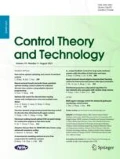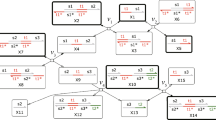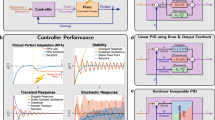Abstract
In practical applications of dynamic DNA nanotechnology, a biomolecular controller is required for maintaining the operation of the molecular actuator at a desired condition based on the information from molecular sensors. By making use of the DNA strand displacement mechanism as a “programming language” in the controller design, a biomolecular PI controller has been proposed. However, this PI control system has been verified only at the simulation level, and a theoretical regulation analysis is still required. Accordingly, in this study, we perform a rigorous regulation analysis of the biomolecular PI control system. Specifically, we theoretically prove that the output signal approaches the target level at a quasi-steady state. To this end, we apply the concept of finite-time regulation property to the biomolecular PI control system.
Similar content being viewed by others
References
Y. Sato, Y. Hiratsuka, I. Kawamata, et al. Micrometer-sized molecular robot changes its shape in response to signal molecules. Science Robotics, 2017, 2(4): 1–10.
S. Murata, A. Konagaya, S. Kobayashi, et al. Molecular robotics: A new paradigm for artifacts. New Generation Computing, 2013, 31(1): 27–45.
T. Nakakuki, J. Imura. Molecular governor: DNA feedback regulator for molecular robotics. SICE Journal of Control, Measurement, and System Integration, 2016, 9(2): 60–69.
D. Soloveichik, G. Seelig, E. Winfree. DNA as a universal substrate for chemical kinetics. Proceedings of the National Academy of Sciences of the United States of America, 2010, 107(12): 5393–5398.
K. Oishi, E. Klavins. A biomolecular implementation of linear I/O systems. IET Systems Biology, 2011, 5(4): 252–260.
B. Yordanov, J. Kim, R. L. Petersen, et al. Computational design of nucleic acid feedback control circuits. ACS Synthetic Biology, 2014, 3(8): 600–616.
N. M. G. Paulino, M. Foo, J. Kim, et al. PID and state feedback controllers using DNA strand displacement reactions. IEEE Control Systems Letters, 2019, 3(4): 805–810.
R. Sawlekar, F. Montefusco, V. V. Kulkarni, et al. Implementing nonlinear feedback controllers using DNA strand displacement reactions. IEEE Transactions on Nanobioscience, 2016, 15(5): 443–454.
T. Nakakuki, J. Imura. Finite-time regulation property of DNA feedback regulator. Automatica, 2020, 114: 1–10.
M. R. Lakin, S. Youssef, F. Polo, et al. Visual DSD: A design and analysis tool for DNA strand displacement systems. Bioinformatics, 2011, 27(22): 3211–3213.
Microsoft Corporation. Visual DSD: https://www.microsoft.com/en-us/research/publication/visual-DSD-a-design-and-analysis-tool-for-dna-strand-displacement-systems/.
S. Kobayashi, K. Yanagibashi, K. Fujimoto, et al. Analog DNA computing devices toward the control of molecular robots. Proceedings of the IEEE 33rd International Symposium on Reliable Distributed Systems: Workshops, Nara: IEEE Computer Society, 2014: DOI https://doi.org/10.1109/SRDSW.2014.7468414.
Author information
Authors and Affiliations
Corresponding author
Additional information
This work was supported by JSPS KAKENHI (No. 17K06500).
Peng RONG received his M.Sc. degree from Kyushu Institute of Technology, Japan, in 2020.
Takashi NAKAKUKI received his B.E. and M.Sc. degrees from Sophia University, Japan, in 1997 and 1999, respectively. From April 1999 to March 2003, he worked at Sony Corporation. He obtained his Ph.D. degree in Mechanical Engineering from Sophia University, Tokyo, Japan, in 2006. He was subsequently employed at RIKEN from April 2006 to March 2009, and at the Department of Mechanical Systems Engineering, Kogakuin University, from April 2009 to March 2013. In April 2013, he joined Kyushu Institute of Technology, where he is currently a Professor in the Department of Intelligent and Control Systems. His research interests are biomolecular systems, complex systems, multi-agent system, nonlinear systems, linear systems, and robust control.
Rights and permissions
About this article
Cite this article
Rong, P., Nakakuki, T. Analysis of finite-time regulation property of biomolecular PI controller. Control Theory Technol. 18, 135–142 (2020). https://doi.org/10.1007/s11768-020-0017-2
Received:
Revised:
Accepted:
Published:
Issue Date:
DOI: https://doi.org/10.1007/s11768-020-0017-2




